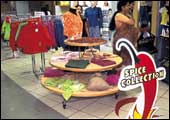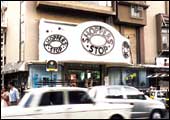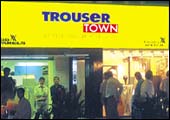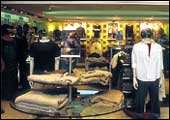 |
| Noel Tata, CEO, Trent: This Westside
story is no tragedy |
The
man who could one day head India's best-known business group may
help you park your car this weekend. The surname is Tata, the first,
Noel; he's 45, half-brother to Tata Group Chairman Ratan Tata, son-in-law
to Pallonji Shapoorji Mistry, the single largest shareholder in
Tata Sons; and he is the chief executive of Trent, the company that
renamed itself after selling its cosmetics brand, Lakmé,
to Hindustan Lever Limited in1998, and the company which is quietly
pressing the Rs 41,300 crore group's cause in the go-go retail sector.
As for the parking bit, Tata visits the Trent-owned
Westside store in Mumbai every weekend, keeping an eye on the quality
of display, chatting up store employees (associates is how Trent
terms them), giving an ear to customer complaints, even helping
park cars in the basement if there is a long line of wheels waiting
to avail the store's valet parking service.
Tata himself, would rather we not speak of
his half-brother, or father-in-law, or mother (the formidable Simone
Tata who built Lakmé into India's best-known cosmetics brand,
and now chairs Trent). He's modest. He's friendly. He's shy. And
he'd rather speak about retail, now that Trent's Westside stores-eight
of them across seven cities-make money. Not too much at Rs 16 lakh,
but they're making money, and that's more than can be said of most
Indian companies in the organised retail space.
| People are speaking about Noel Tata because |
A. The Westside
store-chain he runs has turned profitable.
B. His father-in-law, Pallonji
Shapoorji Mistry, is the single-largest shareholder in Tata
Sons.
C. His half-brother Ratan Tata
heads the Rs 41,300 crore Tata group.
D. All of the above
(correct answer: d. now you know why we've done this story) |
|
|
| Key Westside Numbers |
» Number
of stores: 8
» Total store
space: 1,58,000 square feet
» Stock-Keeping
Units: 30,000
» Plans:
20 stores by 2004
» Revenues:
Rs 73.92 crore in 2001-02; Rs 19.94 crore in
Q1 2002-03
» Footfalls:
10,000 on weekdays; 15,000 on weekends |
The Westside story goes like this: in 1996,
UK-based retailer, Littlewoods entered the Indian market with a
15,000-square feet outlet in Bangalore; in 1998, just when the Indian
subsidiary was considering extending its presence to Chennai, the
UK-parent decided to focus exclusively on the home market; the same
year, Lakmé Exports (a wholly owned subsidiary of Lakmé)
acquired the company and launched the Westside brand; by March 2001,
Trent boasted five Westside stores, 87,000 square feet of retail
space, and a turnover of Rs 41.93 crore; and by March 2002, the
numbers had improved to seven stores, 136,000 square feet of retail
space, revenues of Rs 73.92 crore, and profits of Rs 16 lakh. ''You
require a certain number of stores to break even in this business,''
explains Tata. "Every additional store contributes to the bottomline.''
Westside's quiet progress hasn't gone unnoticed.
The Trent stock, quoting at Rs 145-levels, has become popular with
investors. Alliance Capital Mutual Fund, for instance, holds a 7
per cent stake in the company. "Trent is a growth story,"
gushes Samir Arora, Head, Asian Capital Markets, Alliance Capital.
"As consumer buying shifts from the unorganised sector to the
organised one, growth will follow.''
And the Westside story has propelled a reluctant
Noel Tata into the limelight. After studying in England and France,
Tata's first responsibility in the group was with Tata Exports.
Since then he has held down several positions including Director,
Tata Exports and Managing Director, Lakmé Exports, but Trent,
courtesy Westside, has been his biggest success to date. Suddenly,
it isn't just half-bro Ratan people refer to when they say Tata.
The Essence Of Westside
Noel Tata doesn't like to talk history or personalities.
He is at pains to point out that Trent isn't just him. There's marketing
head (designated General Manager) Himanshu Chakrawarti, operations
head (Vice President) P.K. Anand, and buying head, Gary Newman.
Chakrawarti and Anand are old Lakmé vets. Newman, who has
spent over 16 years honing his purchasing skills, was picked up
by Tata from Australian marketing consulting firm Blaxson. And Tata
himself has taken to retail like a fish takes to h2o.
The people have a part to play in it, but Westside's
success has more to with the model the store-chain has adopted for
itself. Like the Littlewoods store that started it all, the Westside
stores stock an eponymous private-label brand. "This gives
us flexibility over pricing, control over the speed with which we
can introduce new products, and exclusivity over the designs we
sell," explains Tata.
| WESTSIDE'S COMPETITION |
 Pantaloon Pantaloon
Number of outlets: 13
Revenues: Rs 174 crore
Pantaloon follows a department-store format and is driven by
private labels. Close to 70 per cent of the products are Pantaloon's
own. The rest are outsourced
 Shoppers
Stop Shoppers
Stop
Number of outlets: 9
Revenues: Rs 250 crore
A multi-brand department store, Shoppers Stop has recently
launched an entire range of private label brands like Life,
Kashish, and Stop in premium segments.
 Trouser
Town Trouser
Town
Number of outlets: 12
Revenues: N.A.
The Aditya Birla Group's Trouser Town outlets largely sell
the Madura Garments brands
 Wills
Sport Wills
Sport
Number of outlets: 45
Revenues: Rs 18 crore
ITC's foray into retail is built around premium pricing and
a completely outsourced range.
|
The private-label strategy also helps the company
eliminate intermediaries. Result? Higher margins. The world over,
retail chains that follow the private-label approach enjoy higher
margins than those that don't. Tata says retail chains need minimum
margins of 40 per cent to be comfortable; Westside boasts margins
as high as 50 per cent. Rival multi-brand store Shopper's Stop's
are in the 20-25 per cent range.
Creating a brand is an expensive proposition.
Westside's advertising spend almost doubled from Rs 4.01 crore in
1999-2000 to Rs 7 crore in 2001-02. Today, the store-chain spends
nearly twice some of its multi-brand competitors. "It is definitely
much harder to have your own label because you have to spend on
designs, on sourcing, and on brand-building," says Chakrawarti.
"If successful, the company's profit margins could zoom in
the future". Retail consultants agree with that. "There
aren't many national brands in the middle market," says Vivek
Mathur, Associate Director, KSA Technopak. "Westside, by building
a store brand, will definitely enjoy economies of scale and a sustainable
competitive advantage."
The competition doesn't seem overly worried
by Westside's growth. Says B.S. Nagesh, CEO, Shoppers Stop: ''I
think there is enough space for everybody in the business. Actual
competition works out when you have competing stores in the same
catchment.'' Nagesh is right: with the retail apparel market valued
at around Rs 12,000 crore in 2002, and set to grow by between 20
and 25 per cent over the next five years, there's room enough for
everyone.
The Retail Play
Retail, a wag once commented, is in the detail.
It is outsourcing and purchasing efficiencies that have helped Trent
turn the corner. And a smart buying strategy ensures that the 30,000
stock keeping units in the store, and the four seasonal, and continual
weekly changes in the range find favour with customers. In July,
for instance, Newman and a seven-member team from Trent scoured
350-odd retail outlets in London to understand what was hot, and
what, not.
| Tata is clear that Trent's expansion-20 stores
by 2004-will not come at the cost of profitability |
Westside isn't a price-warrior in the conventional
sense of the term, but the store's prices, explains Arora of Alliance,
"meet the average Indian's budget and expectations". One
such Indian is Kintu Shah, a marketing manager at a Mumbai-based
company. "My daughter likes to shop at Westside. She can buy
two trendy blouses for Rs 500.'' Such reactions helped Westside
post a 25 per cent increase in sales in the April-June quarter,
traditionally a lean season for apparel retailers.
Then, there's the usual bunch of customer-focussed
initiatives. Apart from feedback forms (which have actually helped
it launch products), promotions, and a frequent shopper programme,
ClubWest, Westside actually withdraws product-lines where the quality
isn't what it is supposed to be. Employees scan the ClubWest database
and call customers who have purchased something from the defective
line. "Customers are delighted to hear that the store cares
for quality," says Tata.
| With Westside on a roll, Tata is now drafting
the blueprint for Trent's foray into food retailing |
Trent has enough cash on its balance sheet-Rs
135 crore on March 31, 2002-to invest in more stores but Tata, who
is targeting 20 stores by 2004, is clear that the expansion will
not come at the cost of profitability. And so, he has often had
to say no to great store locations simply because the price was
wrong. "The cost of operations is critical in this business,"
avers Kishore Biyani, CEO, Pantaloon, no mean retailer itself.
His surname will ensure that people continue
to speculate about when (rather than if) Noel Tata will head the
Tata Group. His relationship to the single largest shareholder in
Tata Sons, Mistry-Tata is married to his daughter, Aloo-has only
served to increase the intensity of such whispers. Tata himself
refuses to be drawn into any discussion on this: much of his time
goes into drawing up the blueprint for Trent's foray into food retailing.
That should be even more difficult than apparel retailing but if
he succeeds, Tata will definitely be ready for a larger role in
a group where the retail play will only become more important, be
it in automobiles, telecom services, even steel.
|

